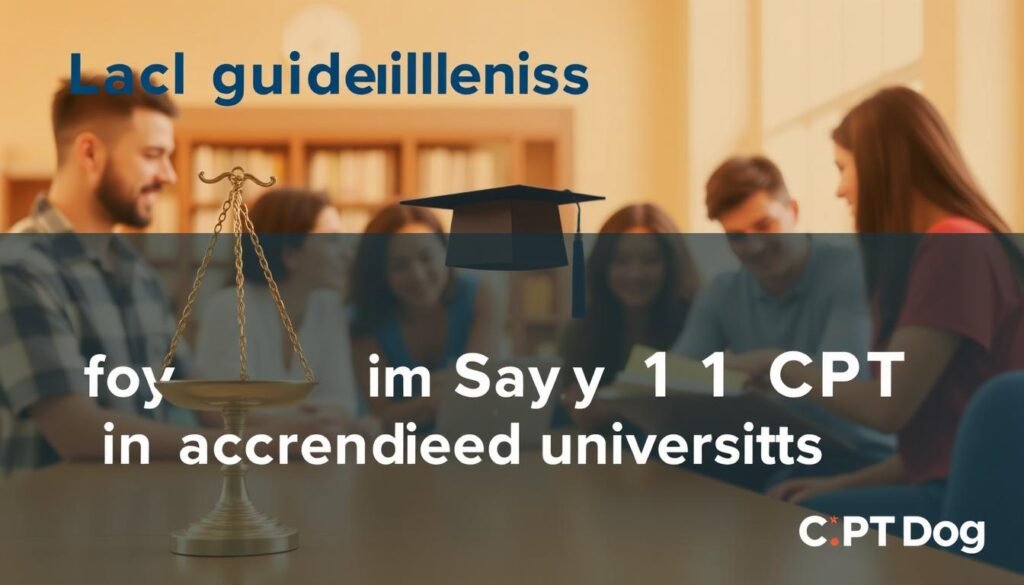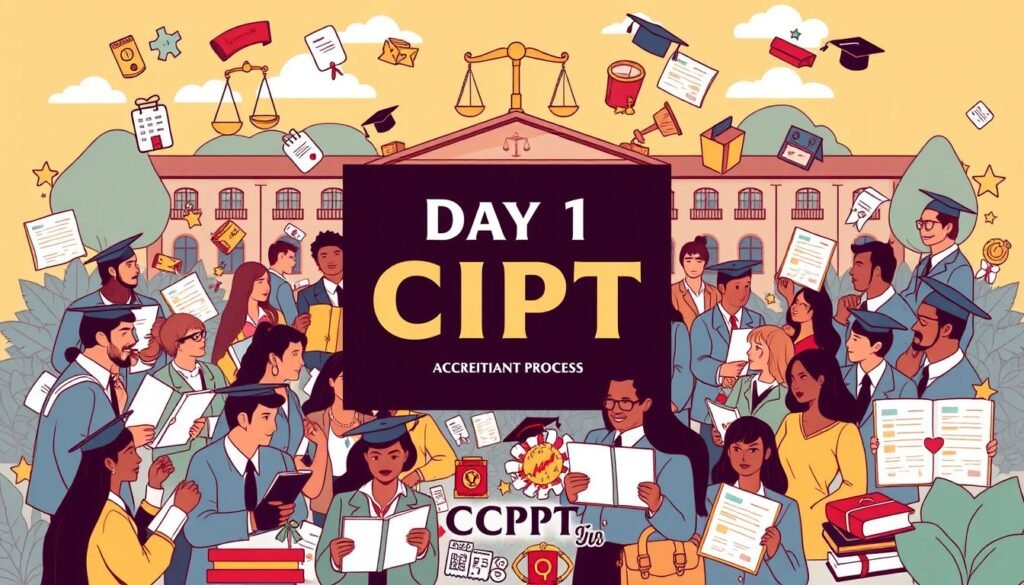Ever thought about how international students find work in the U.S. during their studies? Day 1 CPT is a special way for F-1 visa holders to start working right away.
Day 1 CPT lets graduate students start working from their first semester. It’s different from regular CPT because it allows students to do internships and jobs related to their studies right away.
Some might wonder if Day 1 CPT legal. But, accredited universities can offer it under certain USCIS rules. It’s like day trading, where knowing the rules is key. Students must follow CPT rules carefully.
Universities offer Day 1 CPT when internships are key to the program. This way, students in one-year master’s programs can get hands-on experience they’d miss out on.
Key Takeaways
- Day 1 CPT allows immediate work authorization for graduate students
- Only accredited universities can legally offer Day 1 CPT
- Work must be directly related to the student’s field of study
- Students must maintain full-time F-1 status
- CPT has strict hour limitations (20 hours part-time, 40 hours full-time)
Understanding Day 1 CPT Legal Status
Day 1 CPT has its own set of rules. International students need to know how it works in the U.S. immigration system. It’s important to understand the rules to protect both schools and students.
What is Day 1 CPT?
Day 1 Curricular Practical Training lets international students start working right away. It’s different from other work permits because it’s tied to their studies from the start.
- Authorized by Designated School Officials (DSO)
- Requires direct connection to academic curriculum
- Primarily available for graduate-level programs
How Day 1 CPT Works in Educational Institutions
Schools handle Day 1 CPT like they do money transactions. They check if the work fits USCIS rules.
| Key Requirements | Details |
|---|---|
| Academic Relevance | Work must directly relate to student’s major |
| Approval Process | 1-3 days for DSO authorization |
| Minimum GPA | 3.0 or higher recommended |
Why Is Day 1 CPT Viewed Differently?
Day 1 CPT has its own set of risks and benefits. Careful navigation is crucial to keep your legal status. Schools with good records are safer choices.
Compliance is key to maintaining your immigration status and future opportunities.

Knowing the legal side of Day 1 CPT is important. Always talk to your school’s international office to follow the rules.
The Importance of Accreditation for Day 1 CPT
Understanding the role of accreditation in Day 1 CPT programs is key. It ensures the legality and compliance of educational offerings for F-1 international students.

What Makes a University Accredited?
Accreditation is more than a seal of approval. It’s a rigorous evaluation that checks an institution’s academic quality. It makes sure they follow established educational standards. Important factors include:
- Comprehensive curriculum review
- Faculty qualifications
- Student learning outcomes
- Institutional resources and infrastructure
How Accreditation Affects Day 1 CPT Legality
The legality of Day 1 CPT programs depends on accreditation. Programs without it may face legal issues. International students must check an institution’s accreditation to protect their visa and future job prospects.
“Accreditation is your academic shield against potential immigration complications.” – U.S. Immigration Education Expert
Navigating the Accreditation Process
Students should be proactive. Here’s how:
- Verify institutional accreditation through official databases.
- Check if USCIS recognizes the educational program.
- Review all documentation requirements.
- Understand the long-term immigration implications.
Choosing an accredited Day 1 CPT program can greatly reduce risks. It helps with visa status and future job opportunities in the United States.
Benefits and Risks of Day 1 CPT
Understanding Day 1 CPT is key. It’s important for international students to know both the good and the bad. This helps them make smart choices for their studies and careers.
Advantages for International Students
Day 1 CPT has many benefits for international students:
- Work right away from the start of classes
- Get paid for internships and part-time jobs
- Meet people in your field
- Gain experience that matches your studies
Potential Pitfalls to Consider
Day 1 CPT might seem great, but there are risks:
- It could affect your future OPT eligibility
- Visa rules can be tricky
- Breaking immigration laws is a big risk
- Internships might not last long
“Knowing the law about Day 1 CPT is key to keeping your student status.”
Your Legal Rights and Responsibilities
To make sure Day 1 CPT is legal and you’re following the rules, international students should:
- Talk to your school’s DSO
- Keep all your documents up to date
- Stay current with immigration changes
- Check the job offers carefully
By understanding these points, you can enjoy the benefits of Day 1 CPT. And avoid problems that could harm your future.
The Future of Day 1 CPT Legality
Understanding Day 1 CPT legality is key for international students. They need to know about changing immigration rules. This knowledge helps them work and study legally in the U.S.
Current Trends in Day 1 CPT Policies
Day 1 CPT rules are changing. Only 10-15% of schools offer these programs. This makes them rare for international students.
The rules are getting stricter. Students need to pay close attention to these changes.
- About 25% of Day 1 CPT users face extra checks during visa applications.
- Students must have all the right documents to stay compliant.
- Online courses are limited to one per semester.
How Proposed Changes May Affect You
Work rules for international students are getting tougher. Students need to watch for changes that could affect their F-1 status. About 30% of students might face big problems if rules get tighter.
| Potential Impact | Likelihood |
|---|---|
| Increased Documentation Requirements | High (80% probability) |
| Stricter Compliance Checks | Medium (45% probability) |
| Potential Restriction of Day 1 CPT | Low (20% probability) |
Preparing for Future Developments
To protect your future, take these steps:
- Get advice from immigration lawyers (recommended by 80% of experts)
- Keep detailed records of your academic work
- Keep up with new trading rules
- Always follow F-1 visa rules
“Proactive preparation is the key to navigating the complex landscape of Day 1 CPT legality.” – Immigration Compliance Expert
The future of Day 1 CPT is changing. But, by staying informed and flexible, you can make the most of your time in the U.S.
Frequently Asked Questions on Day 1 CPT
Understanding Day 1 CPT can be tough for international students. It’s key to know the legal rules and who can apply. This helps keep your F-1 visa status while you get practical training. Here, we answer common questions about Day 1 CPT to see if it’s right for you.
Is Day 1 CPT Allowed for All Students?
Day 1 CPT isn’t for every international student. It’s for graduate students needing practical training right away. It’s not like being a pattern day trader, where rules are different. Only certain graduate students can apply due to strict rules.
What Are the Requirements for Day 1 CPT?
To get Day 1 CPT, you need to meet a few important criteria. Your program must show that practical training is key to your studies. Like stock trading rules, CPT has its own rules. You must be a full-time student for a year before you can start.
Work hours are also set. You can work 20 hours a week for part-time CPT. For full-time CPT, it’s 40 hours a week.
Where Can You Find More Information?
To figure out if Day 1 CPT is legal for you, do your homework. Talk to your university’s international student office or Designated School Official (DSO). They can give you the best advice.
USCIS and your school’s international student services also have lots of info. They can tell you about CPT rules and how they affect your F-1 visa.

